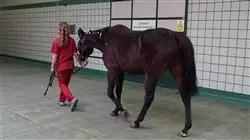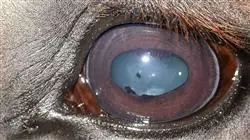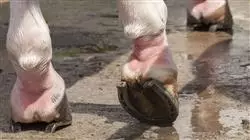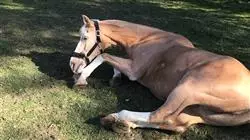University certificate
The world's largest faculty of veterinary medicine”
Description
The most complete and up to date program in Poisoning. Ophthalmic Pathologies. Equine Parasitosis. Donkey Medicine. Hospitalization and Medicine in Geriatric Patients on the online educational market”

This postgraduate certificate lays the foundations for a specialization in Equine Hospital Medicine. It defines the logistics and clinical strategy required in a hospital for horses. It addresses various topics, extremely necessary in order to acquire a global idea of how an equine hospital works and to consider the hospitalization of any patient regardless of their main pathology.
It describes the layout of the different facilities and establishes the necessary guidelines for the cleaning and disinfection of different areas in relation to their degree of contamination by the patients treated in each one. Develop specialized knowledge on advanced pharmacology for hospitalized patients. This program establishes the ideal pharmacological guidelines, antibiotherapy and multimodal analgesia applicable to each patient depending on their severity, which differs greatly from the approach used in field clinics.
Due to the severity of the clinical symptoms presented by most hospitalized patients, it is necessary to establish specific guidelines for fluid therapy and nutrition according to the stabilization requirements and metabolic needs of each patient.
Finally, in the first section of the program, the interpretation of blood count, serum biochemistry and blood gas analysis are discussed as it is very important to establish the severity of hospitalized patients. These diagnostic methods will also be key to monitoring the patients during the hospitalization period.
In addition, a diagnostic approach, treatment and hospitalization on poisoning and the involvement of different systems will be carried out. It also deals with ocular pathologies, which are very frequent in equine clinical practice.
Given the difference between donkeys and horses, it is important to determine those particularities involved in the treatment and most frequent pathologies in donkeys and what to take into account when a veterinarian is faced with geriatric animals.
Finally, it addresses equine respiratory and gastrointestinal parasites, as well as the identification, diagnosis and management of infectious and/or compulsory notifiable diseases.
Join the elite, with this highly effective program and open new paths to help you advance in your professional progress"
This postgraduate certificate in Poisoning. Ophthalmic Pathologies. Equine Parasitosis. Donkey Medicine. Hospitalization and Medicine in Geriatric Patients contains the most complete and up-to-date scientific program on the market. The most important features include:
- The latest technology in online teaching software
- A highly visual teaching system, supported by graphic and schematic contents that are easy to assimilate and understand
- Practical cases presented by practising experts
- State-of-the-art interactive video systems
- Teaching supported by telepractice
- Continuous updating and recycling systems
- Autonomous learning: full compatibility with other occupations
- Practical exercises for self-evaluation and learning verification
- Support groups and educational synergies: questions to the expert, debate and knowledge forums
- Communication with the teacher and individual reflection work
- Content that is accessible from any fixed or portable device with an Internet connection
- Supplementary documentation databases are permanently available, even after the course
A complete educational program that will allow you to acquire the most advanced knowledge in all the areas of intervention of the equine veterinarian"
TECH's teaching staff is made up of professionals from different fields related to this specialty. In this way TECH ensures that it delivers the educational up to date objectives that it aims for. A multidisciplinary team of professionals, experienced in different fields, will develop the theoretical knowledge in an efficient manner, but, above all, will provide students with practical knowledge based on their own experience: one of the differential qualities of this program.
This mastery of the subject matter is complemented by the effectiveness of the methodological design. Developed by a multidisciplinary team of e-Learning experts, it integrates the latest advances in educational technology. This way, you will be able to study with a range of comfortable and versatile multimedia tools that will give you the operability you need during the program.
The design of this scientific program is based on Problem-Based Learning: an approach that views learning as a highly practical process. To achieve this remotely, telepractice will be used: with the help of an innovative interactive video system and Learning from an Expert, students will be able to acquire knowledge and skills as if they were facing the scenario they are learning at that moment. A concept that will make it possible to integrate and fix learning in a more realistic and permanent way.
With the experience of working professionals and the analysis of real success stories, in a high impact educational approach"

With a methodological design based on proven teaching techniques, this innovative course will take you through different teaching approaches to allow you to learn in a dynamic and effective way"
Objectives
Our objective is to prepare highly qualified professionals for the work environment. An objective that is complemented, moreover, in a global manner, by promoting human development that lays the foundations for a better society. This objective is materialized in helping professionals to reach a much higher level of competence and control. A goal that, in just a few months, can be achieved with high intensity and effective instruction.

If your objective is to broaden your skills set to include new paths of success and development, this is the course for you: a program that aspires to excellence"
General Objectives
- Organize and design an equine hospital for optimal clinical and logistical performance for patients of varying severity
- Offer specialized knowledge on hospital pharmacology in detail, so that an equine hospital is properly equipped with the necessary medication for medical therapies for common pathologies, and ICU, resuscitation, and supportive care therapies
- Establish fluid therapy, plasma therapy, and nutrition of hospitalized patients
- Delve into the most common pathologies of the hematopoietic and immune systems that may appear, or develop, in a hospital during the treatment of other primary pathologies
- Examine analytical interpretation: blood count, serum biochemistry and blood gas analysis
- Determine the main causes of intoxication and their involvement in different systems
- Establish an appropriate approach and methodology for ophthalmologic evaluation
- Identify the clinical signs of ocular pathologies
- Provide an in depth knowledge of parasitosis in equids
- Differentiate a clinical approach in the geriatric patient and in donkeys
- Generate specialized knowledge of the correct diagnosis, treatment and management of infectious and/or notifiable diseases
Specific Objectives
- Examine, in detail, the facilities required in an equine hospital
- Define the protocols for action and disinfection in an equine hospital
- Establish guidelines to be followed for infectious animals, as well as the different protocols depending on the degree of infection
- Develop specific pharmacological guidelines and protocols according to the most frequent pathologies in equines
- Establish multimodal analgesia protocols in equids and how to establish pain monitoring in the equine patient
- Classify patients according to their severity when they are hospitalized
- Analyze appropriate maintenance therapies in most hospitalized patients, with emphasis on fluid therapy and water and electrolyte imbalances that may arise during the course of these therapies
- Maintain the correct metabolic status of patients through nutritional control, according to their circumstances
- Develop the pathologies of the hematopoietic and immune systems by developing existing diagnostic methods and appropriate therapies in each case
- Correctly interpret blood analysis, serum biochemistry and blood gases in all types of pathologies and the most common alterations in each of them
- Analyze the origin of intoxications and their involvement in the gastrointestinal, nervous, cardiovascular, lymphatic, hepatic and urinary systems
- Recognize the clinical signs of intoxications related to body condition, skeletal system and epithelium
- Establish work and evaluation methodology for patients with ophthalmic pathologies
- Examine the methodology for the implementation of treatment systems and their management in hospitals
- Gain in-depth knowledge of ophthalmologic evaluation, identification of ocular pathologies and their treatment and hospital management
- Determine the parasites involved in respiratory and gastrointestinal pathologies
- Establish the different treatments for equine parasites
- Examine endocrine pathologies and their particularities in the treatment of donkeys
- Establish an appropriate approach to the geriatric patient
- Examine the most common notifiable diseases and their diagnosis, as well as the management and control of infectious diseases

A path to achieve specialization and professional growth that will propel you towards a greater level of competitiveness in the employment market"
Postgraduate Certificate in Intoxications, Ophthalmic Pathologies and Parasitosis in Equines. Donkey Medicine. Hospitalization and Medicine in Geriatric Patients
.
Intoxications in equids are a common problem in veterinary medicine and can be caused by different substances. Horses are herbivorous animals and are usually very selective in their feeding, but they can still ingest toxic plants or contaminated feed that can affect their health. Some of the most common intoxications in equines include the ingestion of toxic mushrooms, poisonous plants, chemicals and certain medications. If you want to specialize in this new field, at TECH Global University you will find the ideal program to fulfill this purpose. The Postgraduate Certificate in Poisoning, Ophthalmic Pathologies and Parasitosis in Equines. Donkey Medicine. Hospitalization and Medicine in Geriatric Patients is an online postgraduate course of the highest level, which is presented as a unique qualification opportunity to take your skills to the next level. By enrolling in this program, you will learn how to perform ophthalmological examinations, diagnose eye diseases and apply appropriate treatments to preserve equine eye health. In addition, you will know how to perform laboratory analysis and apply effective deworming strategies to keep animals healthy and free of infestations.
Get your degree from the world's largest online veterinary school
.
Symptoms of poisoning in a horse vary, but can include difficulty breathing, vomiting, diarrhea, colic, weakness and seizures. Therefore, it is critical to seek veterinary care immediately if poisoning is suspected in a horse, as, some substances can be lethal if not properly treated. In the area of poisoning, you will learn how to identify and treat the various toxic substances that can affect equines, from plants and food to common chemicals. For ophthalmic pathologies, you'll explore the most common eye conditions affecting equids, including conjunctivitis, keratitis and uveitis. In addition, you'll gain in-depth knowledge of the most common internal and external parasites in these animals, including intestinal worms, mites and lice. Finally, you'll address challenges specific to donkeys, including their particular metabolism, common pathologies and special care.







